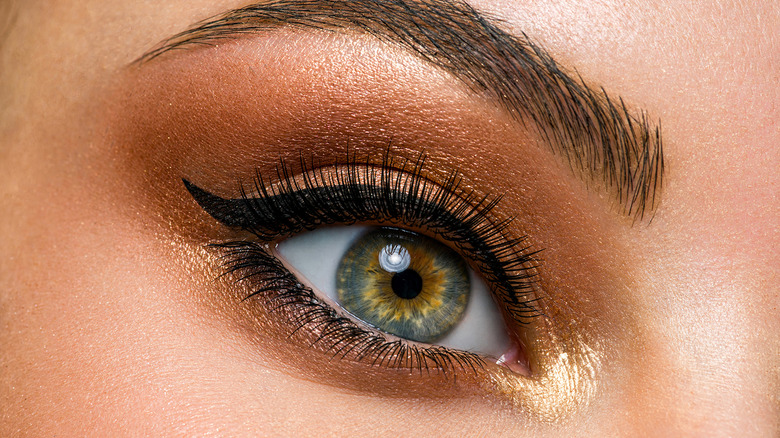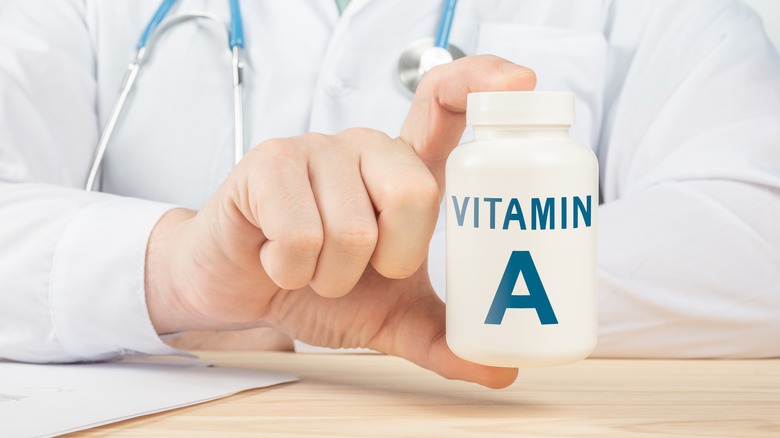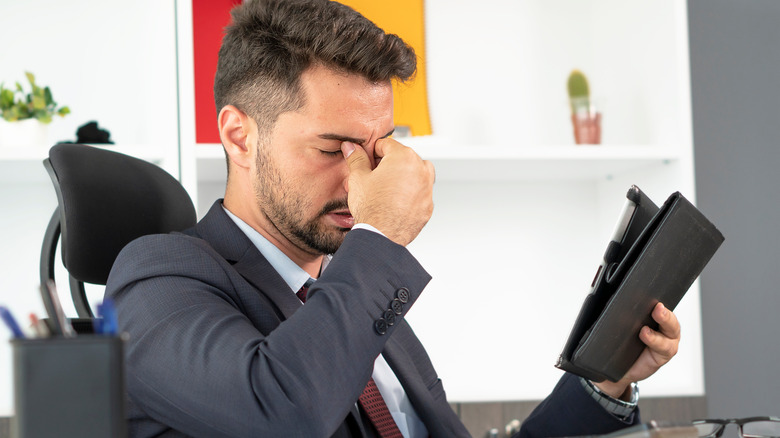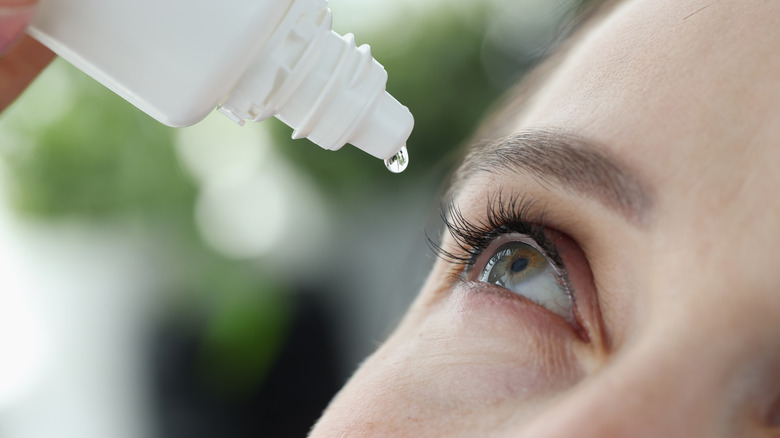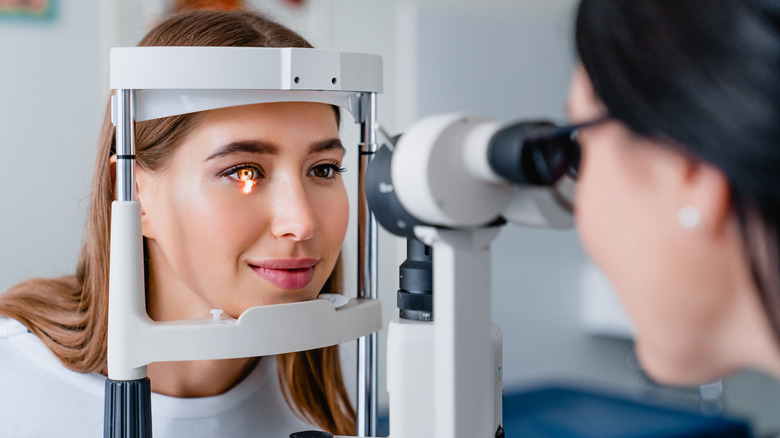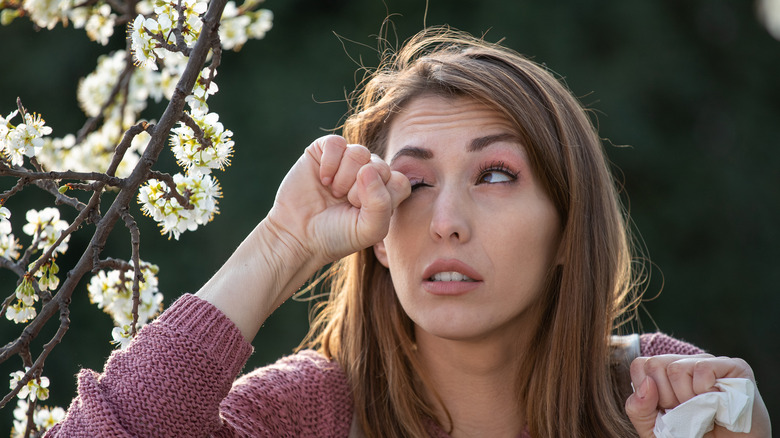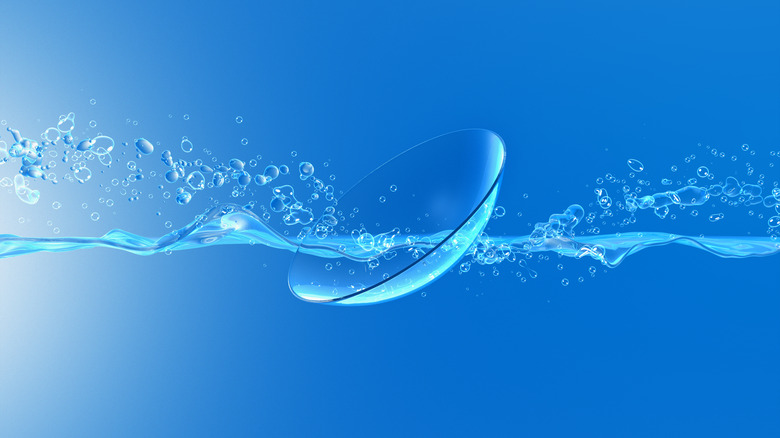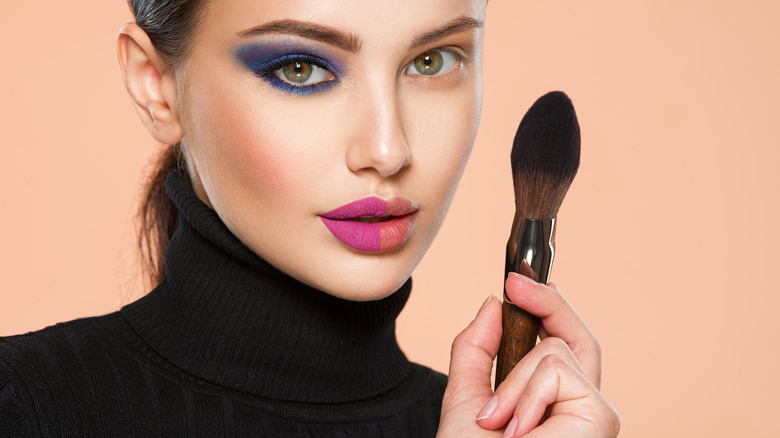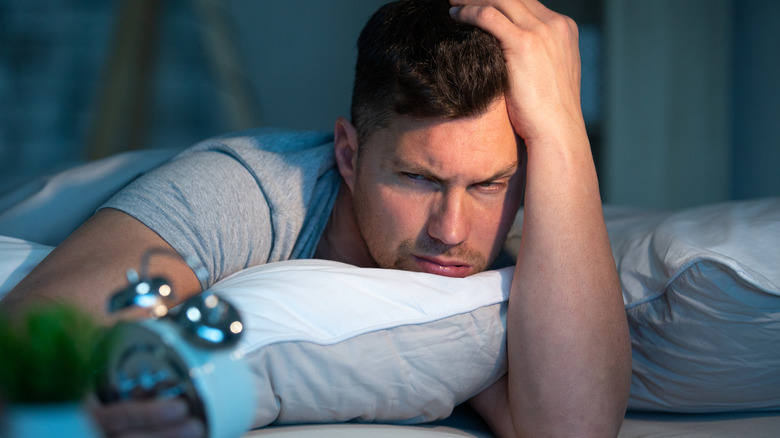14 Things You're Doing That Are Seriously Hurting Your Eyes
They say the eyes are the windows to the soul, but unfortunately, they can also be doorways to severe health issues. According to the American Academy of Ophthalmology, millions of people living in the U.S. are impacted by eye infections and issues on an annual basis.
A Centers for Disease Control and Prevention (CDC) report from 2010 estimated that around a million eye infections requiring medical help occur in the U.S. every year. Specifically, the report focused on a condition called keratitis, where the clear covering over the iris and pupil (i.e., the cornea) becomes inflamed. This can occur for a number of reasons, such as one's eye being exposed to viruses and bacteria, as well as ultraviolet radiation and chemicals. Trauma to the eye can also cause keratitis, as can using contact lenses that are not stored properly or worn overnight. And make no mistake, keratitis can be very detrimental to one's eyesight, and can sometimes even lead to total vision loss. Keep in mind that this is just keratitis. The American Academy of Ophthalmology also lists the annual U.S. stats for a number of common eye diseases like dry eye and glaucoma, all of which are in the millions.
The bottom line is whether or not you wear contact lenses, there are still everyday activities and habits that can put your eyes at risk. However, simple changes could often make a huge difference when it comes to lowering the chances of developing eye-related health problems.
Smoking
When one thinks of the potential health problems that can happen because of smoking, the first thought is usually lung cancer (per the New York Department of Health). Heart disease has also been linked to this habit. However, smoking can also put your eyesight at risk.
According to the New York Department of Health, a smoker is more likely to develop several different eye health problems. For example, smoking at least triples the chances of developing age-related macular degeneration or AMD, where one's vision gradually becomes worse beginning with the ability to read. Regularly smoking 15 cigarettes or more daily also triples the odds of having cataracts. Remember, the eye has a lens inside of it, but this lens can become clouded, which can worsen one's vision. And since smokers are more likely to have high blood pressure and diabetes, they are also more likely to develop glaucoma where the nerves in your eyes are damaged, as well as diabetic retinopathy, which can affect crucial blood vessels for your sight. Additionally, smoking doubles the odds of dry eye syndrome, where the eye can become itchy and irritated.
Although smoking can have a negative effect on one's eyes, it still can be difficult to quit.
If you, or anyone you know, is struggling with addiction, help is available. Visit the Substance Abuse and Mental Health Services Administration (SAMHSA) website or contact SAMHSA's National Helpline at 1-800-662-HELP (4357).
Not getting the right amount of vitamin A
It isn't common for someone living in a developed country to have vitamin A deficiency, according to Healthline. But there are exceptions. Women who are pregnant or breastfeeding could experience lower levels of vitamin A. So can someone with health issues like chronic diarrhea or cystic fibrosis. Individuals with eating disorders could also develop vitamin A deficiency (via Science Direct). And having intestinal bypass surgery can also increase one's chances of notably lower amounts of this vitamin (per Cleveland Clinic).
As Healthline explains, while vitamin A is essential for many areas of the body, a common early sign of vitamin A deficiency is dry eyes, where a person's tear production becomes nonexistent. Also, low vitamin A can result in damage to the cornea, as well as losing one's sight entirely, per Science Direct. In addition, Heart Views explains that severe cases of low vitamin A could cause a condition known as night blindness. Also called nyctalopia, this condition makes it harder to see in low-light environments (like movie theaters).
Although vitamin A deficiency can negatively impact your eyes, too much vitamin A can also affect your vision, as well as cause issues like confusion, dry skin, and mouth ulcers (via Healthline). This usually happens because of supplements as opposed to diet (according to NIH Office of Dietary Supplements), so make sure to talk with your health care professional before trying to increase or decrease your intake of vitamin A.
Not wearing eye protection
We expect to see eye protection in, for example, a high school chemistry class. But did you know that it's even recommended to use safe glasses for everyday activities like cooking? According to the Alabama Optometric Association, there are several types of common materials in the workplace that are potentially dangerous for your eyes — and some of these are things you might encounter in your everyday life.
For example, a carpenter should wear safety glasses with side shields because materials like wood can shoot particles into their eyes (via the Alabama Optometric Association). However, you don't need to be a carpenter to do some DIY home improvement projects around the house. But just because carpentry isn't your occupation doesn't mean you shouldn't take the same precautions and wear eye protection, per Individual Vision Plans. And while people who work with chemicals need to wear goggles to protect their eyes from both chemicals splashing in their face as well as fumes, you should also wear eye protection when you clean with chemicals.
In addition, Individual Vision Plans states that you should wear eye protection when you cook with oil. Why? Well, have you ever had sizzling oil in a pan "spit" on your hand or arm? Not a pleasant experience. Now, imagine that happening to your eye. Other common tasks where it's a good idea to wear eye protection include mowing the law and swimming, whether in a pool or a natural body of water.
Too much screentime
Think about all the different types of screens you use on a daily basis. You're probably reading this article on your phone, your tablet, or your computer. Yes, screens have become a big part of our lives, but overdoing our screentime can take its toll on our eyes.
Whether or not you realize it, you tend to blink less while looking at screens, especially if they have blue light coming from them (per the University of Pittsburgh Schools of the Health Sciences). Factor in how it's more difficult for our eyes to maintain focus when we look at a screen and that the angle at which we hold a screen can physically stress our eyes, and you have a recipe for eye strain. But that's not all. Excessive screentime can cause other vision problems like seeing double, difficulty adjusting our focus from something nearby to something far away, and damage to our retinas, the latter of which can lead to early age-related macular degeneration. Plus, children constantly exposed to the blue light in screens could become nearsighted.
Fortunately, there are things you can do to reduce the potential negative effects of screens. Besides not overdoing your screentime, the University of Pittsburgh Schools of the Health Sciences recommends reducing the brightness and blue light being omitted from a screen. Also, hold devices like tablets and phones roughly 25 inches from your face and at an angle where there isn't any glare from other light sources like the sun.
Misusing eyedrops
On the surface, eyedrops seem like a convenient quick fix for common eye complaints like itchiness or redness. But as the Eye Associates SurgiCenter of Vineland points out, eyedrops meant to relieve red eyes can cause eye problems when they're overused. And the situation can be even worse for someone who wears contact lenses.
When one's eyes become irritated, the blood vessels respond by widening, allowing more blood flow. But this is also why eyes sometimes appear red — and what eyedrops target to take away that redness. In a nutshell, eyedrops make those blood vessels constrict. However, that doesn't fix whatever was irritating one's eyes and causing the blood vessels to widen. And as Dr. Sydney L. Tyson, president and medical director of Eye Associates, told Eye Associates SurgiCenter of Vineland, repetitively using these drops can actually cause one's blood vessels to dilate more, which can lead to more eyedrop use, and potentially, "... a vicious cycle of abusing these eye drops without ever consulting a physician."
While overusing eyedrops can be bad for your eyes, using them with contacts could be extremely dangerous (via Eye Associates SurgiCenter of Vineland). The lens can hold the eyedrops against the cornea (the transparent layer over the iris and pupil) for longer than the drops would normally remain in the eye. Add that to how a contact can block oxygen from the cornea, and a person could experience corneal ulcers.
Not getting your eyes checked regularly
There are many reasons why someone might postpone having their eyes checked. Sometimes, there are scheduling issues (like getting the time off from work). It can also take a while to fill out the paperwork, get tested at different machines, and read the smallest line on an eyechart. And of course, there's the incorrect argument that if your vision hasn't changed and your eyes don't hurt, then there's no reason to get them checked.
Unfortunately, as Harvard explains, just because someone isn't noticing changes in their vision or problems with their eyes in general doesn't mean there aren't potentially serious health issues developing. "With delayed eye care, we're seeing more severe cases of glaucoma and more people coming to the emergency room with advanced vision loss," ophthalmologist Dr. Lucy Shen told Harvard. Case in point: Two of Dr. Shen's patients with glaucoma had normal pressure in their eyes in March. But they canceled their next appointment in June and didn't get checked until September. By that time, the pressure in their eyes had increased to the point that they needed surgery.
Besides glaucoma, a person might not realize they are developing other eye-related conditions like age-related macular degeneration and diabetic retinopathy, since symptoms for some eye health issues don't have noticeable symptoms in their early stages. A person could also be experiencing the beginnings of a potentially blinding condition called an eye stroke and not realize it unless they get their eyes examined.
Rubbing your eyes frequently
When a character rubs their eyes in a movie or a TV show, it could be a quick way of letting the audience know that they're frustrated or confused. But as Dr. Mark Mifflin, a professor of ophthalmology, told the University of Utah, rubbing one's eyes can actually be harmful.
"... chronic eye rubbing can result in the weakening of the cornea and distortion of the cornea called keratoconus," Dr. Mifflin explained. Since the cornea covers the iris and the pupil, its shape being altered can lead to a condition called irregular astigmatism. And once this form of astigmatism has a chance to progress and become severe, it might not be possible to help one's vision with contact lenses and glasses. Dr. Mifflin in particular cautioned that people who have itchy eyes (for example, because of allergies) should avoid constantly rubbing their eyes, even if doing so offers some temporary relief. "Unfortunately, over time, that can actually weaken and distort the eye," he explained. In addition, rubbing one's eyes can also damage one's eyelids, making them more rigid.
Now, the good news is if you rub your eyes every now and then, chances are you won't do any major damage, according to Dr. Mifflin. He also cautioned that pressing too hard on your eye (as you rub your face dry after washing it, for example) could also be potentially bad for your eyes and your vision.
Not removing your contacts before sleeping
Imagine this: Your friend is all set to watch what looks like a new thriller movie on Netflix. Unfortunately, they soon realize that the film isn't nearly as exciting as they had hoped. Throw into the mix that they had a particularly long day at work, and soon they dose off — while wearing their contact lenses. Admittedly, we've all had these moments where we take an unplanned nap. However, sleeping with contact lenses in is potentially dangerous for your eyes.
Now, before we go any further, yes, there are contacts on the market that the FDA has approved as safe to wear while sleeping, according to Healthline. However, in spite of this, the Centers for Disease Control and Prevention (CDC) recommends against sleeping in contact lenses, since doing so can greatly increase the chances of developing an eye infection.
Although we mainly think of our lungs taking in oxygen, our eyes do as well through their corneas. But contact lenses fit over the corneas, so they are blocked from taking in normal amounts of oxygen. In addition, contacts prevent much of the moisture in your eyes from reaching the corneas. Of course, when you close your eyes while you sleep, your corneas are even more starved of oxygen and moisture, and can have a harder time fighting off potentially dangerous bacteria (via Optometry and Vision Science). And remember, eye infections can result in vision loss.
Getting water on your contact lenses
Imagine this: A person loves to swim laps for exercise, but is very nearsighted and needs either their glasses or contacts to see even a short distance in front of them. Since wearing glasses is very inconvenient while they're swimming, they choose instead to leave their contacts in, reasoning that they're not planning to swim underwater. Unfortunately, this mistake could put their eyes in jeopardy.
As the Centers for Disease Control and Prevention (CDC) explains, water (regardless of the source) is bad for contact lenses. Remember, contacts are specially designed to fit the unique shape of your eyes. But when water gets on soft contacts, they can not only become misshapen but also might adhere to your cornea, which can damage it. And just like germs can get into a cut on your skin, abrasions in your cornea can allow dangerous foreign invaders to get inside your eye. Plus, water can have germs in it, including the one that causes Acanthamoeba keratitis, a painful eye infection that, in rare cases, can lead to complete loss of vision.
The bottom line is if there's a chance water will splash into your face and get into your contact lenses, then you should remove them (per the CDC). But what about the above scenario involving the nearsighted swimmer? Well, one possible solution is wearing prescription goggles that will not only stay in place while they swim, but also shield their eyes from the water.
Not removing makeup before bed
In movies and TV shows, it's not unusual to see a woman go to sleep or wake up wearing makeup. In particular, you might notice a female character sleeping in eyeliner and mascara to help accentuate their eyes. But in real life, not removing makeup before bed can be very bad for your eyes' health.
It's not uncommon for someone to move around in their sleep, and as OCLI Vision explains, this can get makeup all over one's blankets and pillow. Unfortunately, that makeup can create an unsanitary situation for your eyes, increasing the chances of you developing eye infections like pink eye. Remember, just because your eyes are closed while you sleep doesn't mean dangerous microbes can't infect them. And if you don't wash your blankets and pillowcase the next day, you'll be exposing yourself to those same unsanitary conditions the next time you turn in for the night or just take a nap in your bed. And the odds of getting an eye infection from makeup only goes up if you use makeup past its expiration date (via OCLI Vision).
Besides possible eye infections, sleeping in one's makeup can also make one's eyes bloodshot and/or itchy (per OCLI Vision). A person could also experience an allergic reaction to makeup that's left on overnight. And from a cosmetic standpoint, not removing mascara before bed on a regular basis can lead to brittle eyelashes that could eventually fall out.
Eating too much sodium
If you like to cook, reducing sodium might seem like a simple task, since you can adjust a recipe. But it's important to beware of foods that already come packed with sodium. For example, as WebMD explains, processed meats like bacon and hot dogs are already high in sodium. And if a person eats sodium-rich foods regularly, they can develop hypertension (a.k.a. high blood pressure), which can be detrimental to one's eyes.
There are several different eye health problems that can occur because of high blood pressure. These include hypertensive retinopathy where, as the name suggests, one's retina is affected (via the Mayo Clinic). Specifically, the blood vessels in the retina become damaged, which can cause bleeding in the eye. And yes, this can make one's vision blurrier — or can result in vision loss. Another hypertension-related eye issue is neuropathy, where blood is unable to flow normally because of blockage in the blood vessels. When this happens, it can badly damage one's optic nerve and lead to vision loss. In addition, a person with high blood pressure could develop choroidopathy, where fluid accumulates underneath the retina (which can in turn distort one's vision).
Besides these specific eye conditions, there's something else important to keep in mind about high blood pressure. While it typically develops gradually, it can also happen quickly and cause blindness, as well as other symptoms like memory loss and chest pain. If someone's blood pressure suddenly rises, call 911.
Not getting enough sleep
From an early age, most people are taught about the importance of getting enough sleep. After all, even if parents don't explain all the benefits of sleep to their children, they usually set a strict bedtime, which emphasizes how important sleep is. And make no mistake, missing out on sleep is bad for your eyes.
Now, let's be clear. We all have an occasional bad night's sleep. But constantly not getting the sleep you need can have a negative impact on your eyes, according to EyeHealth Northwest. Lack of sleep can eventually lead to dry eye, which might cause one's vision to become blurry, as well as increase one's sensitivity to light. And constantly being sleep deprived could increase your chances of developing Anterior Ischemic Optic Neuropathy (AION). If this occurs, your optic nerve doesn't get the blood flow it needs, which can eventually lead to vision loss. However, most people who develop this condition have two things in common: 1) they're either middle aged or elderly, and 2) they have sleep apnea.
Even if the odds are against you developing AION, you should still prioritize getting enough sleep, especially for your eyes' good health. Remember, sleep helps your body refresh itself — and that includes your eyes. If you're not sure if you're getting the right amount of sleep, ask yourself "Do I often get eye twitches?" If the answer is "yes," that could be a telltale sign that you need more sleep.
Not wearing sunglasses with UV protection
Chances are you've seen the phrase "harmful UV rays," but what exactly makes these rays so potentially bad? Well, UV or ultraviolet radiation is in the rays from the sun, per the CDC. And while UV rays can help the human body produce vitamin D, that doesn't mean they aren't potentially dangerous.
Think for a moment about the part of your eyes that you can see. When you go out in the sun without eye protection like sunglasses, those parts of your eyes absorb almost 100% of the UV radiation in the sun's rays (via Johns Hopkins). Keeping in mind that UV light causes your eyes to age more rapidly, it's not surprising that exposing your eyes to UV radiation can have negative consequences. For example, not protecting your eyes from UV rays can lead to both cancerous and noncancerous growths. It also increases the chances of developing conditions like age-related macular degeneration and cataracts. And if the UV rays are reflected off a surface into your eyes (like the surface of a swimming pool), that can cause damage to your cornea.
In addition, UV radiation can also cause cancerous growths on the eyelids. One of these types of growths, squamous cell carcinoma, can spread to the eye itself. And although it doesn't always happen, sometimes the only way to treat this condition is to have the infected eye removed.
Not regularly cleaning your glasses
Now let's be clear. Cleaning glasses in this case doesn't mean using an eyeglass cleaning cloth when the lenses get smudged. No, we're talking about disinfecting your glasses, which (as Stahl Eyecare Experts points out) can carry bacteria.
Of course, your glasses don't directly touch your eyes like contact lenses do, but that doesn't mean what's on your glasses can't cause eye problems. For example, if the bacteria that causes pink eye is on your glasses, it technically could infect your eyes. Another possible bacterium that could be on a pair of glasses is the kind that causes bacterial keratitis, which the AAO explains can cause blindness. Additionally, blepharitis, another condition caused by bacteria, can make your eyelids swollen, red, and sore, and your eyelashes crusty (via AAO). And if that wasn't enough to be concerning, bacteria can also cause swollen glands near the eyelids, which can cause bumps called sties.
Stahl Eyecare Experts recommends washing both your glasses' frame and lenses with warm water and soap every day to minimize the chances of bacteria hanging around long enough to infect your eyes. Stahl also advises using a lint-free cloth instead of a paper towel or a shirt to dry your glasses. And if you're in a pinch and don't have a lint-free cloth, an unused coffee filter is a good lifehack to get your glasses dry without accidentally scratching them.

